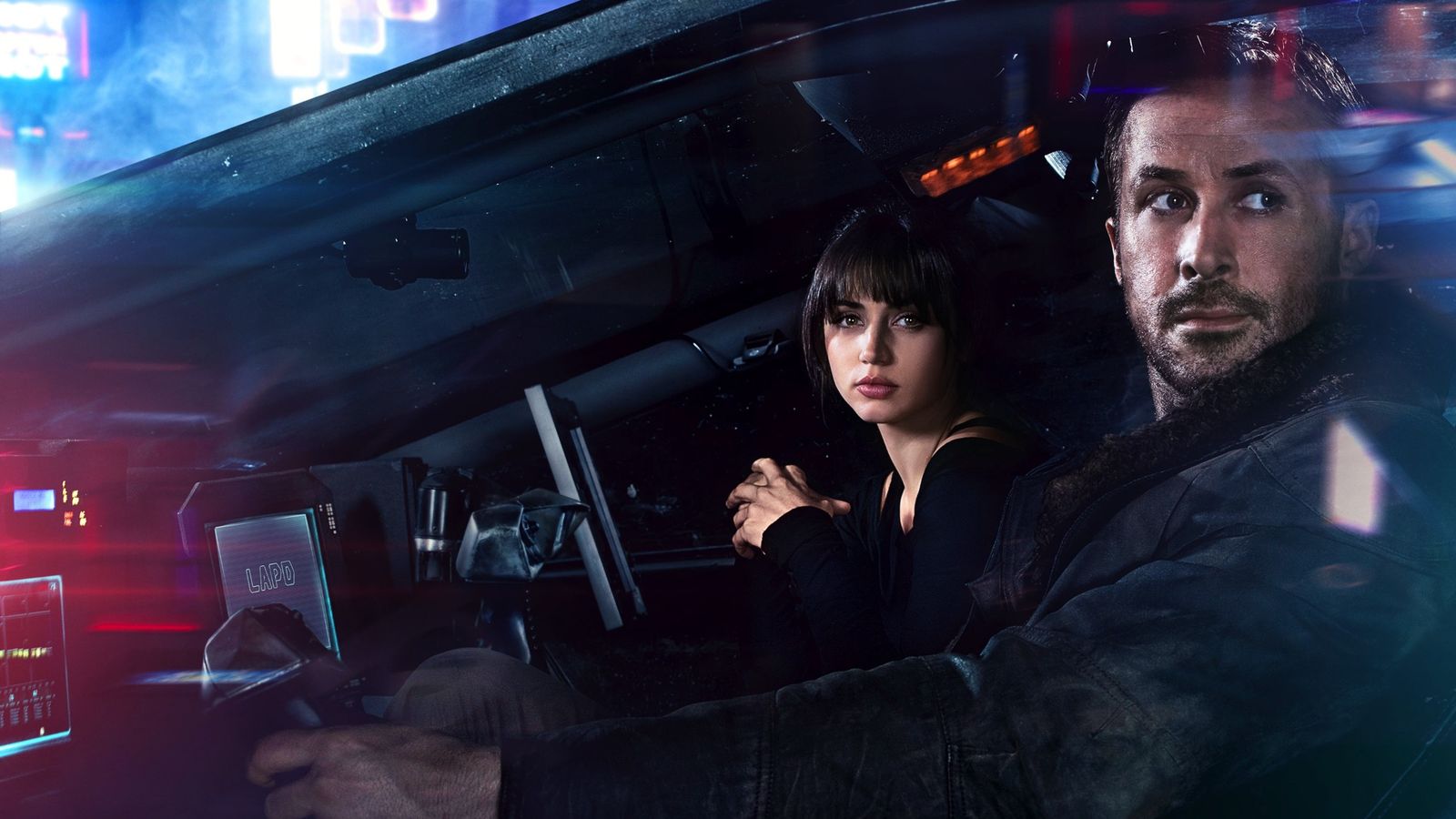
 An admirable and inspired attempt to further continue the story as presented in the
highly influential 1982 classic, Blade Runner, sees modern
visionary Denis Villenueve (Arrival,
Enemy) supplant Ridley Scott (who
executive produces) as director, further opening up the world of the
future beyond Los Angeles in order to ponder on more of the themes of
the first film: what makes us uniquely human, and what our obligation
is to other life (including that which we've engineered to be just
like us)?
An admirable and inspired attempt to further continue the story as presented in the
highly influential 1982 classic, Blade Runner, sees modern
visionary Denis Villenueve (Arrival,
Enemy) supplant Ridley Scott (who
executive produces) as director, further opening up the world of the
future beyond Los Angeles in order to ponder on more of the themes of
the first film: what makes us uniquely human, and what our obligation
is to other life (including that which we've engineered to be just
like us)?
The original Blade Runner, through its Directors Cut to its
Final Cut, put back in a story angle in which Ridley Scott had wanted
to suggest that Rick Deckard is a blade runner (a cop who retires
- aka, executes - rogue replicants) who doesn't know that he's also a replicant. Though Harrison Ford
(The Force Awakens,
The Age of Adaline) does return to one of his most
iconic roles, the answer to that question continues to be complicated,
if not outright directly ignored, by what happens in 2049.
Along those lines, 2049 also brings back one of the original
screenwriters of Blade Runner, Hampton Fancher, though his
original script had been retooled and overhauled by David Webb
Peoples, at Ridley Scott's request way back when. Michael Green
(Logan),
who already worked on a revisionist expansion of a classic Ridley
Scott original property in Alien: Covenant, also shares a
screenwriting credit.
This new chapter picks up thirty years after what happens in Los
Angeles, 2019. We follow a new Los Angeles-based blade runner,
this time one that knows he is a replicant, named K (Gosling,
La La Land), in an era in
which humans and new-model replicants on Earth (ones without a limited
lifespan) are allowed to co-exist, albeit in a tenuous
master-and-servant hierarchy. The blade runners are still
tracking down and targeting the models that may be at large who've
chosen to buck from the lives of servitude they were designed for. On one
case, K discovers clues that lead up to the revelation that there may
have been a replicant that had been able to reproduce a child. K's
superior on the force, Lt. Joshi (Wright,
Wonder Woman), knows this would result in global
chaos should this information go public, putting a certain war between
slave replicants and humans who devalue their lives, and orders K to
destroy all evidence that emerges.
At nearly three hours in length, Blade Runner 2049 finds time
to explore fully its themes, as well as the expansive world of the
future, showcasing the dump of the regions south of Los Angeles, as
well as the under-populated radioactive wasteland of Las Vegas.
Cinematographer Roger Deakins (Hail
Caesar!, Sicario) captures the beauty, as well as the ugliness, of the
futuristic dystopia environment, making 2049 as visually
appealing in its time as its predecessor, though not exactly in the same
groundbreaking of ways. Perhaps it is a bit overdone at times,
as there's a clean and anaesthetized look to the film that makes it
feel like more style over substance. Deakins use of light and
shadow is still second to none. One could certainly attribute
the same criticism to the Ridley Scott original, but that film took
place in a world that felt lived in, even if idealized, whereas
Blade Runner 2049 seems to solely reside in its own pocket
universe, despite exploring beyond the single-city setting.
The best coup of the film is in getting Harrison Ford to return to the
role, which gives the entire project the cred it needs to keep highly
skeptical audiences on board. Even though he isn't the main
star, only coming along in support in the film's second half, there's
enough of him here to sate long-time fans, and a few cameo appearances
from familiar faces also reminds us of the origins of the story, even
if the fan-servicing can encroach into superfluous scene territory.
The performance isn't stellar, but this is in keeping with the
detached Deckard we witnessed in the first film. Stand-out
performances aren't really the lure of this franchise anyway, though
2049 could sure have used the scene-stealing talents of a
Rutger Hauer type to offset the rampant stoicism of most of the
characters in this follow-up.
As for the new actors in the mix, they're fine, with Gosling
delivering an interesting take on a replicant who must deal with his
own feelings of being not worth as much as a human, but also
discovering that there may just be something special about him after
all. That he has feelings for another form of artificial
intelligence makes his descent inward all the more poignant.
Jared Leto (Suicide Squad) plays Niander Wallace, who, as the new Tyrell Corporation
head, is at the forefront of the artificial intelligence community,
though both his look (he's blind but loves visual pop surrounding him)
and his abode that favor aesthetics over function make an already cold
and distant film seem almost clinical in approach, especially as he
begins to conduct experiments on his replicant specimen in his attempt
to recreate recreation. Sylvia Hoeks (The Best Offer) plays Luv, the dangerous
"henchwoman" to Wallace in a way that would be more at home in a
Matrix sequel than in building upon the Blade Runner
epic arc. Ana de Armas (War Dogs) is a stunning companion to K, as Joi, a
hologram that one wonders could have reciprocal feelings for him, or
if it is just part of her programming (echoes of
Her resound
through this entire story element, including a surrogate sex scene
that is nearly identical in its concept).
Overly long, occasionally inert, Blade Runner 2049 tries to
catch up to the original film in both weighty themes and technical
razzle-dazzle, and while a very respectable and challenging effort, it
is a bit of a disappointment in the roads it travels, and, in the end,
that it doesn't offer much more of interest to ponder or marvel at
than what had been brought forth by the 1982 opus. Unlike the
prior entry, which had a few moments of levity and a comic twist in
some of the performances, Villeneuve keeps the story almost completely
on the level of the serious. While the original Blade Runner
pushes forward the look at humanity and creation in the metaphors
offered by its replicants, Blade Runner 2049 continues the
challenging look, but struggles to offer up enough connective tissue
for us to look at our own human selves afterward.
All in all, while I'm content with the follow-up, I walked out of the
theater feeling less than ecstatic, which, given how much of a rabid
fan I am of the 1982 masterpiece, leads me to feel a bit deflated,
especially as I ultimately don't see the events that transpire in
2049 to be really part of the canonical story, only a "what if"
type take. I suppose it is fitting that a film that gives us
more technical achievements to be enraptured by would embody the
themes of both films on how humanity has become more isolated the
further it relies on technology. Like the replicants themselves,
it very much resembles the original in terms of lofty ideals and a
stunning, atmospheric look at a potential future world, but this
effort is more of a very impressive copy that has its own ideas than
it is a fully organic entity on its own.
Qwipster's rating:







©2017 Vince Leo

 An admirable and inspired attempt to further continue the story as presented in the
highly influential 1982 classic,
An admirable and inspired attempt to further continue the story as presented in the
highly influential 1982 classic,